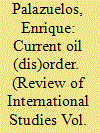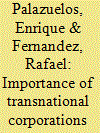|
|
|
Sort Order |
|
|
|
Items / Page
|
|
|
|
|
|
|
| Srl | Item |
| 1 |
ID:
117040


|
|
|
|
|
| Publication |
2012.
|
| Summary/Abstract |
This article has been constructed under the premise that International Political Economy provides the appropriate analytical tools for understanding the characteristics and performance of oil in economic and political relations. The article argues the need to articulate three levels of analysis (major players, scenarios, and exchange mechanisms) in order to understand the economic and political relations that underpin oil exchange during last decades. The central conclusion is that the current oil system is characterised by a set of asymmetric, unstable, and ungovernable relations, whose consequences are unpredictable but not necessarily traumatic.
|
|
|
|
|
|
|
|
|
|
|
|
|
|
|
|
| 2 |
ID:
132409


|
|
|
|
|
| Publication |
2014.
|
| Summary/Abstract |
Several East Asian countries, with scarcely any crude oil, have developed since the second half of the twentieth century strong production capacities in refining and petrochemicals. This has been the case in Japan, Taiwan, Singapore, South Korea, Malaysia, Thailand, Indonesia and China. This paper assesses whether the development of refining and petrochemical industries in these countries may be better understood with the aid of one of the major interpretative paradigms of structural change and foreign relations in East Asia: the Flying Geese Paradigm. The article concludes that, overall, the production and external relations in oil-related industries do indeed follow a Flying Geese Paradigm pattern. We observe, nevertheless, some dissonances that are attributable to the particularities of intermediate sectors (such as refining and basic petrochemistry).
|
|
|
|
|
|
|
|
|
|
|
|
|
|
|
|
| 3 |
ID:
114312


|
|
|
|
|
| Publication |
2012.
|
| Summary/Abstract |
This paper analyzes the positioning of European and American transnational oil companies in the supply of oil from outside Europe to European countries. The analysis focuses on the triangular relationship between: the control that these companies exercise over oil refining and the marketing of petroleum products in Europe; the international production of crude by these companies in oil regions; and the import of crude oil by European countries. Two indicators were developed to assess the relevance of these large corporations: (a) the extent of the supply to their European refineries via their own international production, and (b) the contribution of each company to the total crude oil imports received by six European countries.
|
|
|
|
|
|
|
|
|
|
|
|
|
|
|
|
| 4 |
ID:
097247


|
|
|
|
|
| Publication |
2010.
|
| Summary/Abstract |
This paper analyzes the extent to which the international oil production of transnational companies meets the oil requirements of the United States. Disaggregated data from each company have been used to determine which companies (refineries) are importing crude oil, how much oil each transnational company is produced abroad, and where this production goes to. The analysis show that American international oil production represents a small part of U.S. oil imports. Two conclusions are reached. The first is that U.S. refineries buy the majority of the crude oil they process on the international market and, as a result, are dependent on the unstable conditions of this market. The second is that the economic interests the large American oil companies have abroad are far greater than those they have within the United States and, as a result, these companies do not play a decisive role in a national strategy to guarantee foreign supply.
|
|
|
|
|
|
|
|
|
|
|
|
|
|
|
|
|
|
|
|
|